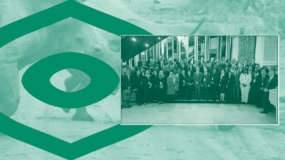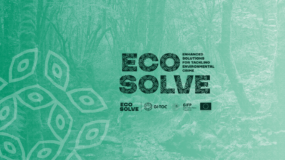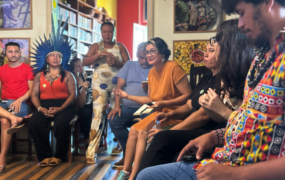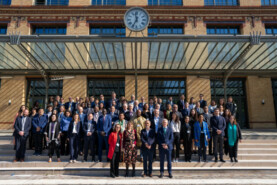Posted on 20 Aug 2025
Joint Statement from environmental defenders Raissa Menezes (Instituto Sucupira, Brazil), Kreyssig Abaunsa (Macarena Birding, Colombia), and Suryo Agung Sumarahadi (Inisiasi Masyarakat Adat – IMA, Indonesia)
A statement following the 1st meeting of the open-ended intergovernmental expert group (IEG) on crimes that affect the environment falling within the scope of the United Nations Convention against Transnational Organized Crime (UNTOC) and related offences covered by the Convention (30 June – 2 July 2025).
Distinguished Delegates, and International Partners,
We issue this statement following our attendance at the 1st meeting of the IEG on crimes that affect the environment, which took place in Vienna from the 30 June to 2 July 2025. Although we could not attend the official sessions of the IEG, we took part in engagements in Vienna, including a Chair’s Special Event, where we presented our situations and views.
As delegates reflect on the first meeting, and consider their positions ahead of the 2nd meeting in early 2026, this statement highlights our own reflections as the only representatives of environmental defenders who attended the first IEG.
We are social leaders from Brazil, Colombia, and Indonesia, working at the intersection of human rights, environmental protection, and community resilience. Though our contexts differ—from forests in the Amazon, to fragile ecosystems in La Macarena, to marine territories across Indonesia—we are united by a shared conviction: that environmental crimes are deeply entangled with corruption and systemic inequality.
Our organizations—Instituto Sucupira, Macarena Birding, and Inisiasi Masyarakat Adat (IMA)—are rooted in community knowledge, scientific research, and Indigenous leadership. We work to protect forests, waters, and biodiversity while building dignified economic alternatives and strengthening the voices of those most affected by these crimes.
Challenges and key issues our communities are facing
In Brazil, Indigenous territories in Pará state are under siege from deforestation, industrial monocultures, and criminal networks that thrive on land grabbing and money laundering. In Colombia, communities in Meta face deforestation due to the expansion of the cattle frontier, limited state response, and threats against environmental defenders working to protect unique ecosystems. In Indonesia, coastal and Indigenous communities confront the devastating impact of illegal fishing, which destroys marine ecosystems, erodes cultural heritage, and fuels corruption and other transnational crimes.
Across all three contexts, we see the same patterns: extractive activities carried out illegally or under weak oversight, communities left vulnerable, defenders exposed to threats, and ecosystems irreparably damaged. Environmental crimes are not isolated, they are part of a network of illicit economies that demand international attention.
We are not diplomats and neither experts on the UNTOC. We are community leaders who defend forests, rivers, and oceans. But it is clear to us that the status quo is not working. Communities are being exploited, environments destroyed, and too often the crimes go unpunished. We came to Vienna to demand change, and we will continue to do so.
Recommendations
Based on the gaps and challenges that we see in our communities, we urge we call on the international community to make concrete advances through the IEG, to work towards the following objectives
- Strengthen international cooperation to trace and monitor commodities linked to environmental crimes (such as timber, soy, cattle, fish, and minerals), drawing on mechanisms modeled on existing UNTOC protocols.
- Establish robust oversight and traceability systems for machinery, equipment, and chemical inputs that enable destructive activities such as mining, industrial farming, and illegal fishing.
- Ensure accessible and simplified funding for community-led conservation projects, removing bureaucratic barriers that exclude grassroots organizations.
- Promote sustainable economic alternatives—such as ecotourism, biodiversity-based enterprises, and Indigenous knowledge-based livelihoods—that provide dignity while protecting forests, rivers, and oceans.
- Create regional and international protection programs for environmental defenders, including rapid-response mechanisms and cross-border cooperation, recognizing the transnational nature of the threats they face.
- Develop a global framework on illegal fishing as a form of environmental crime, ensuring coordinated enforcement, transparency, and accountability across borders.
- And to ensure action and accountability, launch formal negotiations for an additional Protocol to the UN Convention against Transnational Organized Crime (UNTOC). This can become a necessary tool to ensure accountability, protect vulnerable communities, and safeguard our planet.
A call for collaboration, support, and continued dialogue
We are grateful to the Chair of the IEG, Mr Carlos Sanchez del Aguila, of the Peruvian government, along with the EU, Italy and France, for providing the space for us to participate in the first IEG through a Special Event. However, the lack of official participation for civil society remains a weakness of the IEG. Despite the lack of access, we will continue to make our voices heard. In this spirit, we call on Member States, international agencies, and civil society to act with urgency and ambition. Our communities are already innovating and resisting on the frontlines, but without global solidarity and coordinated action, the costs—to people, cultures, and ecosystems—will be irreparable.
Protecting forests, waters, and biodiversity is inseparable from protecting human dignity and justice. Together, we must act!



